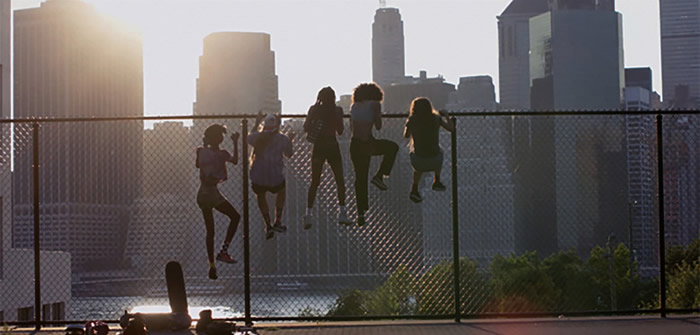‘White Rabbit,’ ‘Skate Kitchen,’ and ‘Shirkers’ are inventive female-driven stories of defiance and identity.
Sundance Film Festival is often marked by movies that chart the struggle of individual expression.
Three female-driven films in this year’s line up keep this tradition alive in portrayals of distinctive young women who strive to grow into their respective voices and form their very own, accepting friendship circles along the way. The stories told in Shirkers, White Rabbit and Skate Kitchen range from dark, mysterious accounts of personal history to hopeful and inspirational tales. What they have in common is defiant women leading their journey to exercise their passion and craft against the odds. All three films break down barriers between true life and fiction.
In Daryl Wein’s down-to-earth White Rabbit , we follow Sophia (Sullivan & Son’s Vivian Bang, also the co-writer of the film alongside Wein), a Korean-born Los Angeles performance artist who pulls daring public acts in supermarkets and other unrestricted city arenas (always in costumes and with a fake accent), to provocatively represent the Korean point-of-view in the USA. While making an honest effort to keep up with her bills and day-to-day responsibilities, she meets a filmmaker who shows interest in casting her, though Sophia quickly grasps the clueless guy can’t separate her performance image that he’s seen online from her real identity. To complicate matters further, she develops profound yet one-sided feelings for a woman she accidentally meets (Nana Ghana) during one of her side, bill-paying jobs.
Wein’s film feels just a tad directionless at times, yet Vivian Bang’s clear, eloquent voice—both on page and screen—strikes an underrepresented chord in examining Asian representation in today’s racial discourse. It also reflects compassion and joy through female friendships while keenly inspecting chance encounters of contemporary strangers challenged by blurry, modern-day beats of intimacy. It’s an unassuming film that cleverly grants its delightful writer-actress an open mic to both confront and entertain.
With the terrific Skate Kitchen , writer-director Crystal Moselle follows up The Wolfpack, her 2015 documentary that became a Sundance sleeper, with a story that feels like a natural next step in her career. Skate Kitchen is a narrative film, but its subjects—a female skating posse from the Lower Eastside of Manhattan—are a real group that Moselle apparently discovered in the subway completely by chance. Her film follows Camille (marvelous newcomer Rachelle Vinberg), a shy skater from Long Island, raised by a loving, attentive single mother who disapproves her skating. Ignoring her mother’s protests, Camille continues to pursue her craft and one day meets the women of “Skate Kitchen”, an adventurous, diverse and tight-knit tribe she first discovers on Instagram and quickly becomes a part of.
Like she did in The Wolfpack, Moselle puts her observant eye to work in Skate Kitchen and tenderly brings Camille to life with reverence, earning both the respect and the curiosity of the audience. Throughout the film, her lens switches from intimate and realistic to magnetic and dreamy, as she follows Camille and her friends through their unique ups and downs as a community (which, of course involves boys and rivalry briefly), female-specific troubles and most importantly, skating that Moselle generously films in prolonged, tightly-edited sequences. Skate Kitchen is elevated by the big-hearted spirit of beloved high-school-set films, except with something superior in its disposal than barren school hallways: New York City streets that pulsate with energy.
The genre-defying Shirkers (World Cinema Documentary Competition) from Sandi Tan might quite possibly be one of the wildest, most inventive films of this year’s documentary line up and will be relatable to anyone who grew up as a film fan in the 90s without any real access to the cool independent movies of the time (aka me.) A cinephile-turned-filmmaker-turned film critic, Tan tells her mind-boggling story in undefined chapters, starting from growing up in Singapore, building a friendship with her soul mates Jasmine and Sophie (they call themselves “The Coen Sisters”) and their insatiable desire to make their own film under the dizzying influence of American Independents. Their lives change suddenly, both for the better (temporarily) and much worse (in the long run) when they meet Georges Cardona, who becomes a mentor and a guiding force in their film they name Shirkers. But after 70 cans of 16mm film, 100s of locations and cast/crew members and nearly 3 months of shooting (mostly done during the “magic hour”), Georges disappears, taking their work with their work. In Shirkers, Tan opens up an old wound nearly 25 years after the fact and treats it like a mysterious detective story.
Blending archival footage and various experimental film techniques, Shirkers, at first glance, deceptively looks to be only about Sandi and her friends’ scrappy independent spirit and eventual manipulation in the hands of a ruthless con artist. At times, you might find yourself wondering whether Tan slightly overestimated the relevance of her personal, painful history. But look deeper and you will find a universal narrative in Shirkers, that examines female rebellion against entitled, deceptive male figures. Watching a group of females give their all to something they believe in only to be robbed by a man is undeniably gut-wrenching. Yet all the same, there is a lot of satisfaction to be found in following Tan’s continued disobedience against male dominance, in the true spirit of the times we live in.
Source: Deadline

